Table of Contents
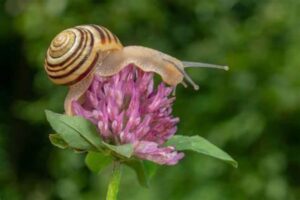
Snails are a common pest in the garden. These pests can be a problem for the entire year but are most active during the warmer summer. Snails have a hard shell that protects them from predators and other natural dangers. Snail shells are usually brown or black, but some species have beautiful colors like purple and yellow.
Because snails are nocturnal creatures, they spend most of their time hiding under rocks or shrubs during the day. When night falls, they emerge from their hiding places to feed on plants and leaves in your garden. Garden snails eat many different types of plants, including vegetables, fruits, and flowers. They also enjoy eating dead vegetation, such as grass clippings or fallen leaves left on the ground in your yard or garden area.
Snails often eat seedlings when they first begin to grow out of their containers and young plants that have just been planted into flower beds or vegetable gardens. Snails are not picky about their food source; they will eat almost anything!
Whenever you see your grass turning yellow, there must be reasons behind it. It may be due to snails, so you should be familiar with all possible means.
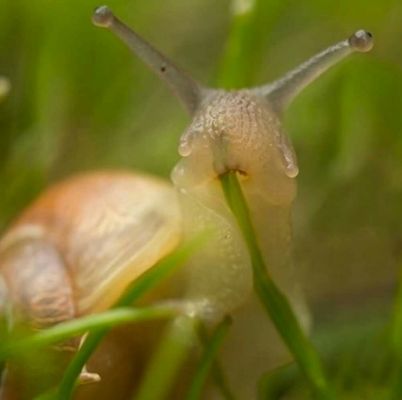
What Do Garden Snails Eat In The Pets And Wilds?
Snails are herbivores and eat various plants, including leaves, stems, flowers, fruits, and seeds. They also eat fungi and algae on the surface of leaves and other plant parts. As scavengers, Garden Snails also eat dead plant matter that has fallen onto the ground from trees and other plants.
Snail Diet
Snail diet includes:
- Plants: Snails consume many plant materials, including leaves, stems, flowers, and fruits. They can be seen eating grasses, herbs, and vegetables in the garden or even in your flower beds!
- Fungi: The Garden Snail diet is not limited to plants alone; they also consume fungi such as mushrooms or lichens growing on trees or other surfaces in their environment.
- Decaying matter: As scavengers, Garden Snails will also eat decaying matter, such as dead leaves or other organic matter found on the forest floor or in gardens.
- Leaves: Garden snails are known to eat a wide variety of leaves, including lettuce, spinach, cabbage, and plantain.
- Flowers: Snails also consume dandelions, hibiscus, and clover flowers.
- Fruits and vegetables: Snails enjoy eating ripe fruits such as apples, pears, and strawberries, as well as vegetables like carrots, cucumbers, and tomatoes.
- Bark and stems: In some cases, snails may also feed on the bark and stems of plants, especially when other food sources are scarce.
- Algae: Some snails feed on algae, which can be found in freshwater and marine environments.
- Grass roots: This is one of the most common foods for snails since it is easy to find and plentiful.
Garden Snail Nutrition
Snails could be more nutritious for humans to eat. However, they are high in protein and calcium, which makes them suitable for inclusion in a balanced diet for pets such as cats and dogs.
Garden Snails Eat Decaying Plant Matter and Fungi
Snails prefer to eat decaying plant matter and fungi over living plants. They will eat dead leaves and other plant matter on the ground and fungus growing beneath the soil surface. Garden snails also enjoy eating mushrooms!
What Do You Feed Garden Snails?
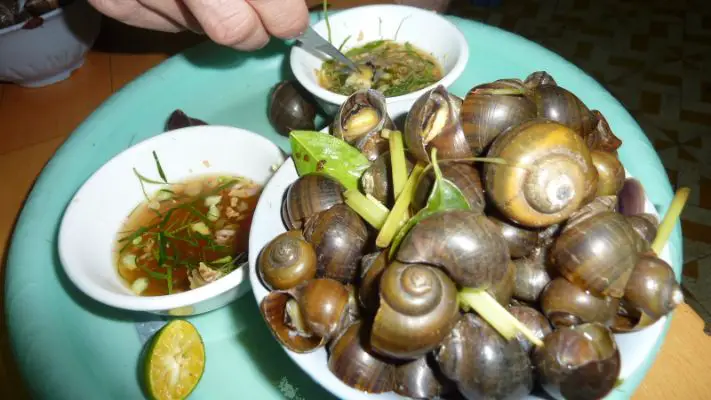
You can feed garden snails on diatoms, which are microscopic algae. Diatoms in water come in many different shapes, sizes, and colors.
You can also feed them crushed eggs or ground-up eggs if you have chickens or other birds in your yard.
Feeding them a mixture of crushed eggshells and diatoms will help keep them out of your garden and away from your plants so they don’t eat them up!
What Can Garden Snails Not Eat?
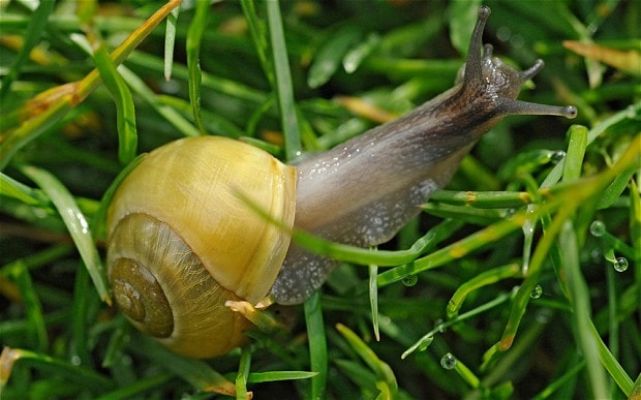
Some examples of what garden snails should not eat include:
- Onions and garlic: Snails are sensitive to onions and garlic, so avoid feeding them these foods.
- Nuts and seeds: Nuts and seeds can cause an intestinal blockage in garden snails. They also lack calcium, which is essential for healthy shell growth.
- Insects: Snails should not be fed insects like crickets or worms because these can cause an upset stomach in your snail or even kill it if eaten too often.
- Lawn clippings: Snails should not be fed lawn clippings since this can cause them to become bloated and die from internal ruptures.
- Other animals: It’s important to keep your snail away from other pets in the house. It’s best if they don’t even see other animals. They might consider food!
- Food that could spoil quickly: The food you give your snail should be able to keep for at least a few days, especially if you have many snails. This is because if they don’t eat all their food within a few days, it will start to rot and become harmful for them to consume. If you want to feed your snails something like lettuce or carrots, ensure they are in good condition and not wilting or moldy.
- Foods with seeds or pits: Seeds or pits can get stuck in their shells or digestive tract and cause problems later on down the road. For example, sunflower seeds have large seeds that are hard for the animal’s digestive system to break down, so these should be avoided altogether.
- Salt: Snails have a low salt tolerance, and consuming too much salt can be harmful or even fatal. Do not feed them foods high in salt, such as chips or pretzels.
- Dry or hard foods: Snails need moist environments to thrive, so they should not be fed dry or hard foods that can be difficult to digest. Examples include dry bread, crackers, or pasta.
- Citrus fruits: Citrus fruits such as oranges and lemons can be too acidic for snails and may cause digestive problems.
- Spicy foods: Snails have a sensitive digestive system, so they should not be fed spicy or heavily seasoned foods that may irritate their digestive tract.
What Plants Do Not Garden Snails Eat?
Snails are known to be able to eat a variety of different types of food, including plants and other organic matter. However, some things garden snails should not eat. Some examples of what garden snails should not eat include:
- Diseased plants: Snails should never be fed diseased plants since this can spread disease throughout your garden and kill any nearby plants.
- Poisonous plants: Garden snails should not be fed any plants known to be toxic or poisonous to animals, such as azaleas, daffodils, and foxgloves.
- Plants with thorns or spines: If you have prickly plants in your garden, don’t feed them to your snails. This includes cacti and other succulents, roses, trees, and shrubs. Snails can be injured by these plants, which can cause serious health problems for the snail.
What Vegetables Do Snails Eat?
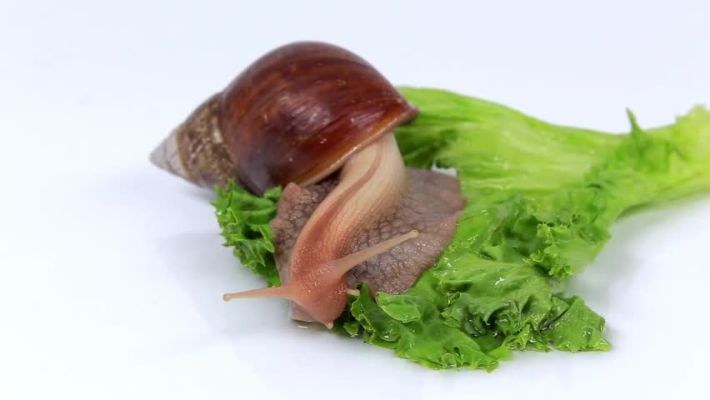
Snails are herbivores, meaning they only eat plants. Snails are not picky eaters and will munch on almost anything they come across. Some examples of vegetables that snails may eat include:
- Carrots: Most people think that snails love carrots because they are similar in shape to lettuce, but snails prefer carrots because they have more nutrients and vitamins.
- Peas: Snails also like peas, although they often eat them before they ripen enough to be picked.
- Lettuce: Snails love lettuce, one of their favorite foods.
- Cucumber: Slices of cucumber are another popular snack for snails.
- Peppers: Snails will also eat peppers if allowed to do so.
- Tomato: Snails also enjoy tomatoes, so many people grow these plants in containers so they do not have to worry about their snails eating them!
- Kale: Kale is a nutritious leafy green that snails may enjoy eating.
- Spinach: Spinach is another nutritious leafy green that you can add to your snail’s diet.
- Radishes: Radishes are root vegetables that can provide your garden snail with essential vitamins and minerals.
- Cabbage: Cabbage is another vegetable that can be added to your snail’s diet, but only in small amounts.
- Broccoli: Broccoli makes for a great snack for your garden snails and is also healthy for them!
- Zucchini: Zucchini is another healthy veggie for your garden snails to eat.
- Corn: Corn is another favorite for snails, especially if it has gone to seed and fallen to the ground. Snails will consume corn kernels and leave behind a slime trail as they travel through their environment.
- Squash: Snails may enjoy feeding on squash pieces like summer squash or zucchini. This can be a great way to use any extra squash in your garden.
- Vegetable Scraps: Snails will also eat most types of vegetable scraps. They are especially fond of lettuce, cabbage, and carrots. Although they do not need to eat these foods every day, they should receive some vegetable matter daily.
- Pine Cones: Pine cones make an excellent addition to your snail’s diet. They contain many vitamins and minerals that your pet will need to stay healthy.
How To Get Rid Of Garden Snail?
While some gardeners may find snails beneficial, others consider them pests.
If you have a problem with snails in your garden, there are various ways to get rid of them. Some people use snail bait pellets or liquids, which poison the snails when they eat them. Other methods include trapping and crushing the snails or removing their food source by spraying plants with water or removing dead foliage from the area.
However, to keep the snails around as pets instead of killing them, you’ll need to feed them something more appealing than leaves and rotting plants!
FAQs
Are snails pests?
Snails can be considered pests in certain situations. In agricultural settings, snails can damage crops and cause significant economic losses. They can also be a nuisance in gardens and landscaping, as they may consume plants and flowers. In addition, some species of snails can be carriers of diseases affecting humans and animals. However, snails also play critical ecological roles in their natural habitats and are sometimes kept as pets. So whether or not snails are considered pests depends on the specific context and situation.
Can garden snails eat each other?
While garden snails are primarily herbivores and feed on plants, they may occasionally eat each other if they are hungry and lack other food sources. This behaviour is commonly seen in captivity or crowded conditions, where competition for food and resources may exist. In their natural habitat, snails are more likely to feed on decaying plant matter or other organic material rather than each other. However, it is essential to note that cannibalism is not a standard or preferred behaviour for garden snails and should not be encouraged.
How often do snails eat?
Snails can go for several days without food if necessary, but they require a regular food supply to maintain their health and growth. In captivity, snails should be offered food daily, and any uneaten food should be removed to avoid spoilage and bacterial growth. In the wild, snails may feed less frequently if food is scarce, but they will still need to consume enough to meet their energy needs and avoid starvation.
